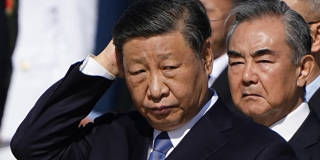By prioritizing security and stability – through surveillance, control, and coercion – over economic dynamism, China’s leaders are abandoning some of the policies and principles that underpinned the country’s “economic miracle.” Unless they change course, the entire global economy will suffer.
TOKYO – At their recent summit in San Francisco, US President Joe Biden and Chinese President Xi Jinping made progress in a few key areas. Notably, they agreed to resume direct military-to-military communications – which China had suspended last year, following a visit by then-Speaker of the House of Representatives Nancy Pelosi to Taiwan – in order to reduce the chances of accidental conflict. But neither leader was negotiating from a particularly strong position: as Biden struggles with low approval ratings, Xi is overseeing a rapidly weakening economy.
The economic news out of China has been poor for some time. Growth is slowing; the population is declining; the property sector is facing huge losses; banks are grappling with non-performing loans; and foreign investment is falling. Each of these developments has its own cause and cure, but together, they paint a grim picture – so grim, in fact, that some now wonder whether China is facing a long period of stagnation similar to the one from which Japan has only recently emerged.
Like China, Japan benefited from a prolonged period of robust economic performance – GDP growth in the 1950s and 1960s averaged 9-10% – before slowing to 5-6% growth in the 1970s and 1980s. This is not hard to explain. As incomes per capita catch up to those in advanced economies, the increase in per capita income becomes more difficult to sustain, and GDP growth slows. This pattern – known as “growth convergence” – can also be observed in Hong Kong, Singapore, South Korea, and Taiwan.

TOKYO – At their recent summit in San Francisco, US President Joe Biden and Chinese President Xi Jinping made progress in a few key areas. Notably, they agreed to resume direct military-to-military communications – which China had suspended last year, following a visit by then-Speaker of the House of Representatives Nancy Pelosi to Taiwan – in order to reduce the chances of accidental conflict. But neither leader was negotiating from a particularly strong position: as Biden struggles with low approval ratings, Xi is overseeing a rapidly weakening economy.
The economic news out of China has been poor for some time. Growth is slowing; the population is declining; the property sector is facing huge losses; banks are grappling with non-performing loans; and foreign investment is falling. Each of these developments has its own cause and cure, but together, they paint a grim picture – so grim, in fact, that some now wonder whether China is facing a long period of stagnation similar to the one from which Japan has only recently emerged.
Like China, Japan benefited from a prolonged period of robust economic performance – GDP growth in the 1950s and 1960s averaged 9-10% – before slowing to 5-6% growth in the 1970s and 1980s. This is not hard to explain. As incomes per capita catch up to those in advanced economies, the increase in per capita income becomes more difficult to sustain, and GDP growth slows. This pattern – known as “growth convergence” – can also be observed in Hong Kong, Singapore, South Korea, and Taiwan.